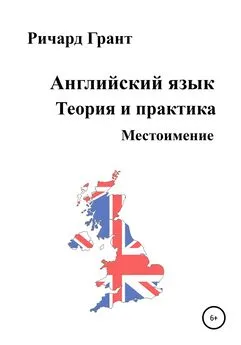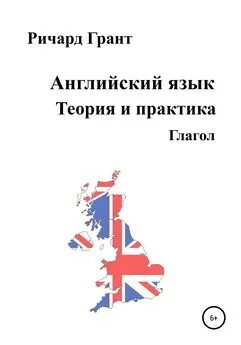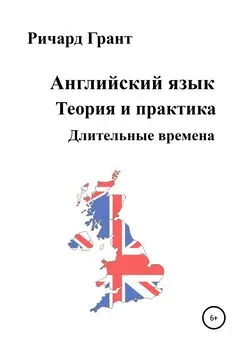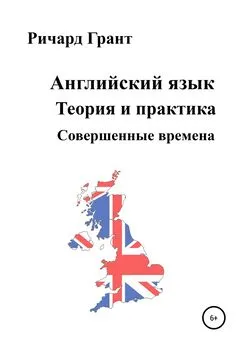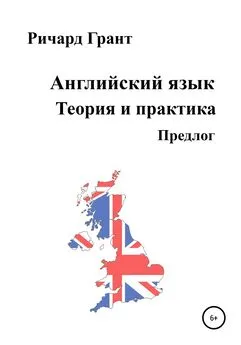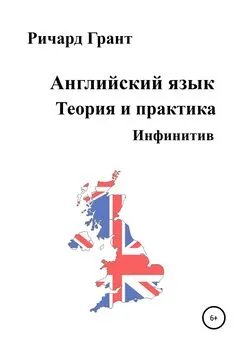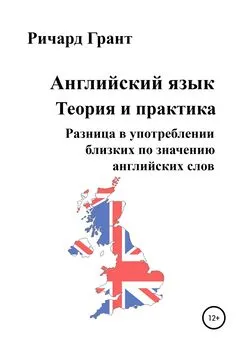Ричард Грант - Английский язык. Теория и практика. Местоимение
- Название:Английский язык. Теория и практика. Местоимение
- Автор:
- Жанр:
- Издательство:неизвестно
- Год:2022
- ISBN:978-5-532-95775-6
- Рейтинг:
- Избранное:Добавить в избранное
-
Отзывы:
-
Ваша оценка:
Ричард Грант - Английский язык. Теория и практика. Местоимение краткое содержание
Английский язык. Теория и практика. Местоимение - читать онлайн бесплатно ознакомительный отрывок
Интервал:
Закладка:
Упражнение 18
Поставьте необходимое возвратное местоимение.
The water is hot, don’t burn …. – The water is hot, don’t burn yourself.
1. I am angry with …. 2. Can you do many things …? 3. You see you've cut … again. Be more careful. 4. He fell down and hurt …. 5. Does your friend Nick often talk to you about …? 6. I think that poor dog hurt …. 7. Tell me more about …. 8. Did your mother buy anything for … last week? 9. He came into the room and introduced …. 10. She believes in …. 11. Are you always sure of …? 12. We didn't know where to hide …. 13. We are sure of …. 14. Can a little child take care of …?
Упражнение 19
Поставьте необходимое возвратное местоимение.
1. She is very sure of …. 2. They did everything …. 3. Do you believe in …? 4. Children, you can't do that …. 5. Did you translate the text …? 6. Did the pupils answer all the questions …? 7. They always speak only about …. 8. I saw everything …. 9. Did you make the dress …? 10. We should always believe in …. 11. The knife was sharp, and she cut …. 12. Babies cannot look after …. 13. They introduced …. 14. I tried to control ….
Упражнение 20
Найдите ошибки в некоторых предложениях и исправьте их.
1. My sister taught himself to swim. 2. Anna repaired the chair herself. 3. The children are making themselves something to eat. 4. I hurt me when I fell down the stairs. 5. We're meeting ourselves at 8.00 this evening. 6. We're enjoying ourselves very much.
Упражнение 21
Ответьте на вопросы, подразумевая, что всю работу люди сделали самостоятельно.
Who bought that book for him? – He bought it himself.
1. Who cooked your breakfast this morning? 2. Who helped them to translate the text? 3. Who helped the little girl to dress? 4. Who helped you to find the way? 5. Who cleaned your classroom? 6. Who washes your clothes? 7. Who broke his tape-recorder? 8. Who built their house? 9. Who helped her to do maths? 10. Who planted the garden in front of your house?
Упражнение 22
Заполните пропуски возвратными местоимениями, где это необходимо.
1. All our friends enjoyed … at his birthday party. 2. I often speak to … when I'm in bad mood and alone. 3. Polly and Nancy, help … to sweets and juice. 4. Concentrate … if you don't want to fail your exam. 5. They haven't decided yet where they'd meet …. 6. Little Polly is only two but she can dress …. 7. She got up, washed … and left the house without disturbing anyone. 8. I'm not angry with him. I'm angry with …. 9. Relax … when you dance. 10. They never think about other people. They only think about …. 11. Who went with her? – Nobody. She went by …. 12. Let's hide … under that tree. The rain is so heavy. 13. He feels … not well today. 14. Don't take him to the party. He'll spoil everything …. 15. We didn't know who that young guy was. He didn't introduce …. 16. It's windy, you may catch cold …. 17. Children, take the towel and dry ….
Взаимные местоимения
– Взаимные местоимения – описывают взаимоотношения между двумя или более лицами или, реже, предметами.
К взаимным местоимениям относятся местоимения:
each other – друг друга
one another – один другого
По правилам традиционной грамматики местоимение each other применимо только к двум лицам, а one another используется в отношении более двух лиц.
Однако на практике этим правилом часто пренебрегают. Оба местоимения изменяются только по падежу ( each other’s, one another’s).
We think of each other as of a good, interesting opponent. – Мы относимся друг к другу, как к хорошему, интересному сопернику.
My hamsters keep stealing one another’s food. – Мои хомяки вечно воруют друг у друга еду.
Соответствующий предлог ставится перед словами each или one:
We live too far from each other. – Мы живем слишком далеко друг от друга.
They are such good friends they will do anything for each other. – Они такие хорошие друзья, что друг для друга что угодно сделают.
Упражнение 23
Найдите ошибки в некоторых предложениях и исправьте их.
1. John and Mary looked at each other. I would say he looked at her with admiration. 2. Peter and Susan have met each other. 3. Elka, Yvonne and Joanna gave each other a book. 4. Three children talked to each other. They stood next to my house. 5. My uncle and I talk to each other every day. Although his character isn't easy to bear. 6. She and her brother stopped talking and looked at each other. 7. John and his mother bought each other presents for Christmas. 8. My cat and his dog looked at each other with dread. 9. Barbara's three sons and their father hate each other. 10. I think that all people should love each other. No matter where they live.
Вопросительные местоимения
– Вопросительные местоимения – используются для построения специальных вопросов.
Они обозначают неизвестные спрашивающему, лица или предметы, которые должны быть названы в ответе на вопрос.
К вопросительным относятся следующие местоимения:
who – который, кто, what – что, какой, which – который, кто, какой, whose – чей, чьё, whoever – кто бы ни, который бы ни, whatever – что бы ни, (хоть) что-нибудь, whichever – какой угодно, какой бы ни
Употребление вопросительных местоимений
Из всех вопросительных местоимений только who изменяется по падежам и имеет форму объектного падежа whom, однако в разговорной речи ее использование необязательно.
Whom did you invite for your birthday? – Кого ты пригласил на день рождения?
Местоимение which, в отличие от what, предполагает выбор между ограниченным набором лиц или предметов:
I’d paint my room in blue or yellow. Which of the colours do you like more? – Я бы покрасила свою комнату синим или желтым цветом. Который из этих (двух) цветов тебе нравится больше?
I have no idea what colour to use in my room. What colours do you like? – Понятия не имею, в какой цвет покрасить свою комнату. Какие цвета (любые) тебе нравятся?
Местоимения whoever, whichever и whatever в вопросах передают изумление или негодование:
Whatever is this thing on the floor? – Что это такое на полу?
Упражнение 24
Поставьте необходимое вопросительное местоимение.
1. How … students are in the class right now? 2. … are you planning to leave? 3. … is that person next to you? 4. … are you writing a letter to? 5. … do you do for living? 6. … is the reason for your visit? We haven’t seen each other for a while. 7. … this book belong to? 8. … are you going after graduation? 9. … do you expect to be in five years? 10. … color do you prefer most? 11. … did you meet at the conference? 12. … pattern do you like? Both dresses look great. 13. … is your brother going to do with his job? 14. … did you go for the holiday? – We went to Spain. 15. … is responsible for guest accommodation in your hotel?
Упражнение 25
Выберите правильный вариант ответа .
1. The coach, ( which/who) was appointed just last week, made no comment on the situation. 2. Isn’t that the street ( which/where) the accident happened last night? 3. The human brain, ( which/what) weighs about 1400 grams, is ten times the size of a baboon’s. 4. There are several reasons ( where/why) I don’t want to talk to Mike. 5. This is the university ( which/where) I work. 6. The new guy in our group ( who/whose) name is Alex, seems really nice. 7. All the friends to ( who/whom) the e-mail was sent replied. 8. February 14th ( where/when) we express our love to each other, is known as St. Valentine’s Day. 9. A very popular breed of dog is the German Shepherd ( what/which) is often used as a guard dog. 10. The unsinkable Titanic sank on its maiden voyage, ( what/which) shocked the whole world.
Относительные местоимения
– Относительные местоимения – связывают придаточное предложение с главным, при этом они отличаются от союзов тем, что являются членами придаточного предложения:
I know the lecturer who will make today’s report. ( who служит подлежащим придаточного предложения) – Я знаю лектора, который сегодня будет делать доклад.
К относительным местоимениям относятся:
who – который, кто, whose – чей, чьё, which – который, кто, that – тот, та, то
Местоимение who обозначает людей:
This is the engineer who has designed the new engine. – Вот тот инженер, который создал новый двигатель.
Местоимение whose отражает принадлежность к одушевленным предметам:
Читать дальшеИнтервал:
Закладка:
